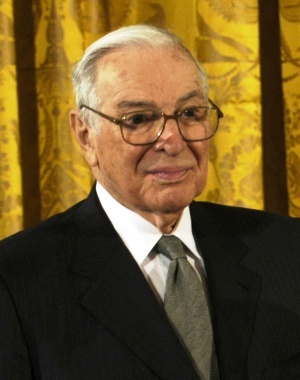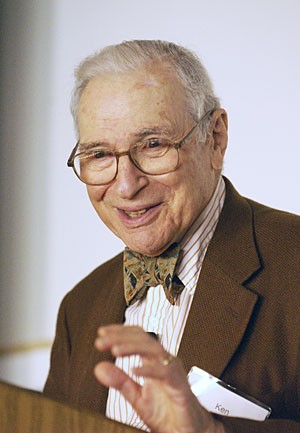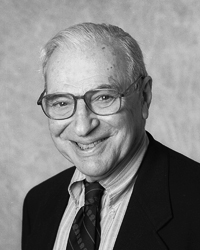<Back to Index>
- Economist Kenneth Joseph Arrow, 1921
- Composer Moritz Moszkowski, 1854
- Frankish Ruler Charles Martel, 688
PAGE SPONSOR



Kenneth Joseph Arrow (born August 23, 1921) is an American economist and joint winner of the Nobel Memorial Prize in Economics with John Hicks in 1972. To date, he is the youngest person to have received this award, at 51.
In economics, he is considered an important figure in post-World War II neo-classical economic theory.
Many of his former graduate students have gone on to win the Nobel
Memorial Prize themselves. Ken Arrow's impact on the economics
profession has been tremendous. For more than fifty years he has been
one of the most influential of all practicing economists. His most significant works are his contributions to social choice theory, notably "Arrow's impossibility theorem", and his work on general equilibrium analysis. He has also provided foundational work in many other areas of economics, including endogenous growth theory and the economics of information. Arrow was born on August 23, 1921, in New York City to parents of Romanian Jewish origins. His family was very supportive of his education. He graduated from Townsend Harris High School and then earned a Bachelor's degree from the City College of New York in 1940 in mathematics. At Columbia University, he received a Master's degree in 1941. From 1946 to 1949 he spent his time partly as a graduate student at Columbia and partly as a research associate at the Cowles Commission for Research in Economics at the University of Chicago. During that time he also held the rank of Assistant Professor in Economics at the University of Chicago. In 1951 he earned his Ph.D. from Columbia. Arrow is brother to the economist Anita Summers, uncle to economist Larry Summers, and brother-in-law of the economist Robert Summers. He is currently the Joan Kenney Professor of Economics and Professor of Operations Research, Emeritus at Stanford University. He is also a founding member of the Pontifical Academy of Social Sciences. He is a trustee of Economists for Peace and Security. He was a convening lead author for the Intergovernmental Panel on Climate Change. He is also Editor of the Annual Review of Economics. Arrow's monograph Social Choice and Individual Values derives from his Ph.D. thesis. In it he sets out a key result (in one final form). General Possibility Theorem: It is impossible to formulate a social preference ordering that satisfies all of the following conditions: The theorem has tremendous implications for welfare economics and theories of justice. It was extended by Amartya Sen to the liberal paradox which argued that given a status of "Minimal Liberty" there was no way to obtain Pareto optimality, nor to avoid the problem of social choice of neutral but unequal results. An example of this would be to have the following choices to divide a cake between three people. Let us call them A, B and C. Choice
1: A gets nothing, B and C get half each. Choice 2: B gets nothing, A
and C get half each. Choice 3: C gets nothing, A and B get half each.
Choice 4: divide the cake equally. Thus,
if each person votes to get as much cake as possible, choice 4 would be
third from the top in everyone's list, and would in any direct choice
lose 2 to 1 against an unequal distribution. Since all of these choices
are Pareto-optimal - no one's welfare can be improved without reducing
the welfare of others - choice 4 would not be chosen, since there would
always be other preferred choices.
Working with Gerard Debreu Arrow
produced the first rigorous proof of the existence of a market clearing
equilibrium, given certain restrictive assumptions. For this work and
his other contributions, Debreu won the Nobel prize in 1983. Arrow went
on to extend the model and its analysis to include uncertainty, the stability of equilibria, and whether a competitive equilibrium is efficient.
Arrow was instrumental in kick-starting research into endogenous growth theory (also known as new growth theory)
which sought to explain the source of technical change, which is a key
driver of economic growth. Until this theory came to prominence,
technical change was assumed to occur exogenously - that is, it was assumed to occur with no explanation of why it
occurred. Endogenous growth theory provided standard economic reasons
for why firms innovate - so innovation and technical change are
determined endogenously -
that is, within the model (hence the name). A vast literature on this
theory has developed subsequently to Arrow's pioneering work.
In other pioneering research, Arrow investigated the problems caused by asymmetric information in
markets. In many transactions, one party (usually the seller) has more
information about the product being sold than the other party.
Asymmetric information creates incentives for the party with more
information to cheat the party with less information; as a result, a
number of market structures have developed, including warranties and third party authentication,
which enable markets with asymmetric information to function. Arrow
analysed this issue for medical care (a 1963 paper entitled "Uncertainty and the Welfare Economics of Medical Care",
in the American Economic Review); later researchers investigated many
other markets, particularly second hand assets, online auctions and
insurance.
He was one of the recipients of the 2004 National Medal of Science,
the nation's highest scientific honor, presented by President George W.
Bush for his contributions to research on the problem of making
decisions using imperfect information and his research on bearing risk.